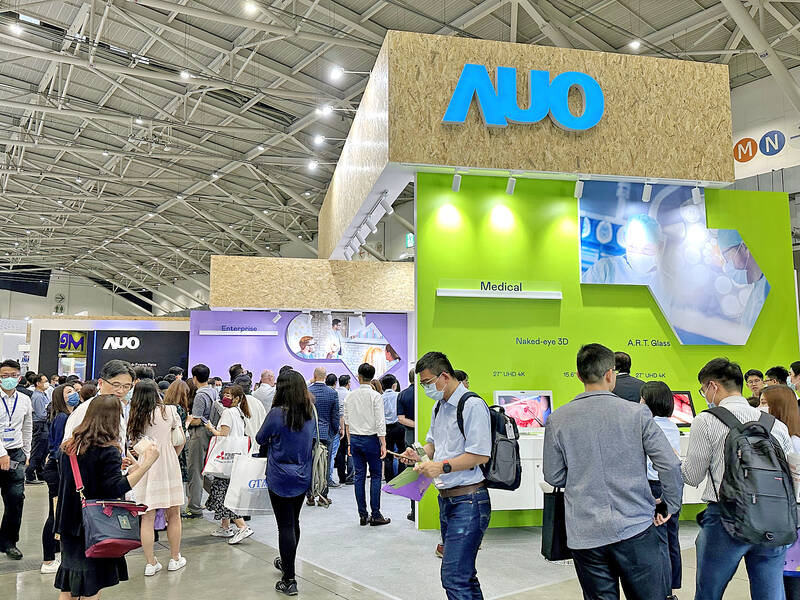Flat-panel maker AUO Corp (友達) yesterday posted its smallest quarterly loss in about five quarters as customers restocked ahead of shopping seasons, and demand for TVs and notebook computers emerged from two years of corrections.
AUO’s net losses improved to NT$975 million (US$30.07 million) in the quarter ended Sept. 30, compared with losses of NT$10.91 billion in the second quarter and NT$10.43 billion in the third quarter last year.
Gross margin rose to 7.6 percent last quarter from 3.1 percent the previous quarter and minus-14.6 percent in the same period last year.

Photo: Chen Mei-ying, Taipei Times
Shipments climbed 3 percent sequentially last quarter, driven by seasonal demand, the company said.
Average selling prices jumped 5 percent quarter-on-quarter to US$329 per square meter, the first uptick since the first quarter.
This quarter, shipments of computer and TV panels would dip about 15 percent sequentially as restocking demand among customers is approaching an end, AUO said.
The upward trend of average selling prices would extend into this quarter with a quarterly increase of 2 to 3 percent, the company said.
“The seasonal restocking demand is to phase out in the second half of the fourth quarter,” AUO chairman Paul Peng (彭?浪) told investors during a quarterly meeting yesterday. “Consumer demand for end devices is expected to remain weak for a period of time because of lingering macroeconomic pressure. Key interest rates in the US are still very high.”
The bright spot is that demand and supply dynamics in the flat-panel industry are moving in a positive direction, with channel inventory returning to healthy levels, while TV and PC brand vendors are taking a prudent approach to manage inventory, Peng said.
Most panel manufacturers have adjusted their equipment utilization to match demand, he said.
AUO said its factory utilization was 80 percent last quarter, but it planned to lower it this quarter as demand declines.
The company yesterday trimmed its capital spending plan for this year by about 14 percent to NT$30 billion, compared with an estimate of NT$35 billion three months ago.
AUO said it would only spend on next-generation display technology, not on expanding capacity.
With years of investment, its micro-LED technology would be commercialized by the end of this year, with shipments to start for use in smart watches, it said.
The next applications for the new display technology would be premium TVs and vehicles, AUO said.
To facilitate the production of micro-LED panels, AUO’s board of directors yesterday approved an investment of NT$700 million to build a 6-inch micro-LED chip-on-carrier production line in Taoyuan’s Longtan District (龍潭) with subsidiary PlayNitride Inc (錼創).
AUO yesterday provided additional details about its ambition to become a major supplier of intelligent cockpit operation systems by acquiring Germany’s Behr-Hella Thermocontrol GmbH.
AUO supplies flat panels used in vehicles, as well as modules integrated with touch and human-machine-interface (HMI) features.
It said it expects revenue from displays with HMI features to make up about 25 percent of its revenue from automotive displays in 2025, up from 10 percent this year, driven by the uptake of electric and autonomous vehicles.

POWERING UP: PSUs for AI servers made up about 50% of Delta’s total server PSU revenue during the first three quarters of last year, the company said Power supply and electronic components maker Delta Electronics Inc (台達電) reported record-high revenue of NT$161.61 billion (US$5.11 billion) for last quarter and said it remains positive about this quarter. Last quarter’s figure was up 7.6 percent from the previous quarter and 41.51 percent higher than a year earlier, and largely in line with Yuanta Securities Investment Consulting Co’s (元大投顧) forecast of NT$160 billion. Delta’s annual revenue last year rose 31.76 percent year-on-year to NT$554.89 billion, also a record high for the company. Its strong performance reflected continued demand for high-performance power solutions and advanced liquid-cooling products used in artificial intelligence (AI) data centers,

SIZE MATTERS: TSMC started phasing out 8-inch wafer production last year, while Samsung is more aggressively retiring 8-inch capacity, TrendForce said Chipmakers are expected to raise prices of 8-inch wafers by up to 20 percent this year on concern over supply constraints as major contract chipmakers Taiwan Semiconductor Manufacturing Co (TSMC, 台積電) and Samsung Electronics Co gradually retire less advanced wafer capacity, TrendForce Corp (集邦科技) said yesterday. It is the first significant across-the-board price hike since a global semiconductor correction in 2023, the Taipei-based market researcher said in a report. Global 8-inch wafer capacity slid 0.3 percent year-on-year last year, although 8-inch wafer prices still hovered at relatively stable levels throughout the year, TrendForce said. The downward trend is expected to continue this year,

A proposed billionaires’ tax in California has ignited a political uproar in Silicon Valley, with tech titans threatening to leave the state while California Governor Gavin Newsom of the Democratic Party maneuvers to defeat a levy that he fears would lead to an exodus of wealth. A technology mecca, California has more billionaires than any other US state — a few hundred, by some estimates. About half its personal income tax revenue, a financial backbone in the nearly US$350 billion budget, comes from the top 1 percent of earners. A large healthcare union is attempting to place a proposal before

Vincent Wei led fellow Singaporean farmers around an empty Malaysian plot, laying out plans for a greenhouse and rows of leafy vegetables. What he pitched was not just space for crops, but a lifeline for growers struggling to make ends meet in a city-state with high prices and little vacant land. The future agriculture hub is part of a joint special economic zone launched last year by the two neighbors, expected to cost US$123 million and produce 10,000 tonnes of fresh produce annually. It is attracting Singaporean farmers with promises of cheaper land, labor and energy just over the border.